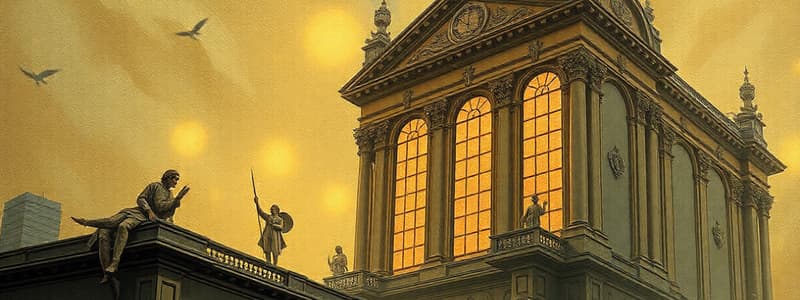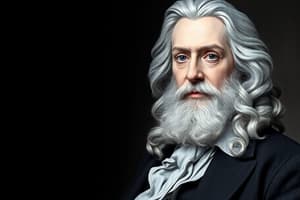Podcast
Questions and Answers
What is a central contradiction in Locke's theories as discussed in relation to the Virginia colony?
What is a central contradiction in Locke's theories as discussed in relation to the Virginia colony?
- Locke supports feudalism as a justified form of governance.
- Locke claims all humans have rights, yet slavery was practiced. (correct)
- Locke advocates for absolute monarchy.
- Locke only refers to rights concerning property ownership.
What does Locke suggest is the only justifiable form of slavery?
What does Locke suggest is the only justifiable form of slavery?
- Slavery following a just war. (correct)
- Slavery in a state of nature.
- Slavery based on social class.
- Slavery endorsed by the government.
Which aspect of Locke's philosophy was believed to have influenced a key historical event?
Which aspect of Locke's philosophy was believed to have influenced a key historical event?
- The signing of the Magna Carta.
- The French Revolution.
- The American Revolution. (correct)
- The establishment of the English monarchy.
What question is posed regarding natural rights and ownership?
What question is posed regarding natural rights and ownership?
What is Roger Woolhouse's stance concerning Locke's theories and Afro-American slavery?
What is Roger Woolhouse's stance concerning Locke's theories and Afro-American slavery?
What distinguishes John Locke's view of the state of nature from that of Hobbes?
What distinguishes John Locke's view of the state of nature from that of Hobbes?
How does Locke's concept of natural rights differ from societal rights?
How does Locke's concept of natural rights differ from societal rights?
What is John Locke's stance on suicide in relation to God's purposes?
What is John Locke's stance on suicide in relation to God's purposes?
What role does reason play in Locke’s philosophy about human nature?
What role does reason play in Locke’s philosophy about human nature?
According to Locke, what is the primary source of ownership over humans?
According to Locke, what is the primary source of ownership over humans?
What are the natural rights mentioned in the content?
What are the natural rights mentioned in the content?
In the absence of formal authorities, what often arises to address rights violations?
In the absence of formal authorities, what often arises to address rights violations?
What do individuals give up when they enter into society?
What do individuals give up when they enter into society?
According to the content, the power of society is bound to govern by what?
According to the content, the power of society is bound to govern by what?
What is considered the point of government, according to the content?
What is considered the point of government, according to the content?
Which philosopher differs from the view that the state of nature is amoral?
Which philosopher differs from the view that the state of nature is amoral?
Who is bound to govern according to the laws established by the community?
Who is bound to govern according to the laws established by the community?
What does the term 'civil society' refer to in this context?
What does the term 'civil society' refer to in this context?
What is the primary purpose of government according to Locke?
What is the primary purpose of government according to Locke?
How does Locke view Robert Filmer's idea of the government as a family?
How does Locke view Robert Filmer's idea of the government as a family?
What key feature does Locke advocate for in a parliamentary government?
What key feature does Locke advocate for in a parliamentary government?
Under what circumstances does Locke argue revolution is justified?
Under what circumstances does Locke argue revolution is justified?
What is one of the main aspects of the constitution of legislative authority according to Locke?
What is one of the main aspects of the constitution of legislative authority according to Locke?
What happens when individuals make laws without authority, according to Locke?
What happens when individuals make laws without authority, according to Locke?
What does Locke suggest about a ruler who uses force to violate rights?
What does Locke suggest about a ruler who uses force to violate rights?
What concept does Locke reject regarding the authority of kings?
What concept does Locke reject regarding the authority of kings?
Flashcards
John Locke's Philosophy
John Locke's Philosophy
John Locke was an empiricist philosopher who believed in the separation of church and state and that reason should guide our understanding of God's plan for humanity.
State of Nature (Locke)
State of Nature (Locke)
Locke's state of nature is a moral realm where natural rights exist prior to any social contract. It is governed by natural law, which comes from God.
God's Property (Locke)
God's Property (Locke)
Locke believed humans are God's property, created equal and made to last as long as God wills. This concept underlines the inherent right to life and the wrongfulness of suicide.
Natural Rights in State of Nature
Natural Rights in State of Nature
Signup and view all the flashcards
Difference Between Locke and Hobbes
Difference Between Locke and Hobbes
Signup and view all the flashcards
Natural Rights
Natural Rights
Signup and view all the flashcards
Locke's Influence on the American Revolution
Locke's Influence on the American Revolution
Signup and view all the flashcards
Locke and Slavery
Locke and Slavery
Signup and view all the flashcards
Revolution Justification
Revolution Justification
Signup and view all the flashcards
Property Rights and Ownership
Property Rights and Ownership
Signup and view all the flashcards
Law of Nature
Law of Nature
Signup and view all the flashcards
State of Nature
State of Nature
Signup and view all the flashcards
Exit from the State of Nature
Exit from the State of Nature
Signup and view all the flashcards
Purpose of Government
Purpose of Government
Signup and view all the flashcards
Limited Government
Limited Government
Signup and view all the flashcards
Rule of Law
Rule of Law
Signup and view all the flashcards
Legitimate Government
Legitimate Government
Signup and view all the flashcards
Government's Purpose
Government's Purpose
Signup and view all the flashcards
Against Absolute Monarchy
Against Absolute Monarchy
Signup and view all the flashcards
Parliamentary Government
Parliamentary Government
Signup and view all the flashcards
Legislative Authority
Legislative Authority
Signup and view all the flashcards
Unlawful Laws
Unlawful Laws
Signup and view all the flashcards
Right to Resist Tyranny
Right to Resist Tyranny
Signup and view all the flashcards
Legitimate Revolution
Legitimate Revolution
Signup and view all the flashcards
State of Nature and War
State of Nature and War
Signup and view all the flashcards
Study Notes
John Locke (1632-1704)
- Empiricist and Evidentialist Christian
- Advocated for tolerance of diverse Christian denominations
- Championed the separation of church and state
- Believed reason is crucial for understanding human nature and discovering truth
- Argued that reason alone can illuminate God's plan
- Authored the Second Treatise of Civil Government
The Second Treatise of Civil Government
- Examines the legitimate role of government
- Contrasts Locke's view of the state of nature with Hobbes'
- Argues that a moral standard exists in the state of nature, derived from God, preceding human agreements
- Contends that government's purpose is to protect natural rights (life, liberty, health, and property)
We Are God's Property
- Locke's concept of humanity as God's property and the implications for individual action
- Stresses that humans are created for God's purposes and not for each other's use
- Emphasizes the inherent equality within humanity
- Questions the legitimacy of subordination among humans in terms of God's design
The State of Nature and Survival
- Emphasizes God's ownership of people and their duties to God
- Argues that God grants people the right to survive and to acquire necessities
- Explores the morality of suicide as opposed to God's plan
- Points to prior thinkers like Thomas Aquinas on the concept of basic goods
- Discusses natural rights or basic rights
Natural Rights
- Natural rights exist independent of societal structures
- Distinguishes natural rights from rights created by human beings(fair trial or the right to vote)
- Outlines natural rights as encompassing life, liberty, health, and property
- Natural law, as dictated by reason, governs the state of nature
- All people are equal and independent, and no one should harm another in life, health, liberty, or possessions
Exit From the State of Nature
- Contrasts the state of nature with Hobbes' view, arguing that it's not entirely amoral
- The absence of authorities to judge and punish violations leads to issues like vigilante justice and angry mobs
- Addresses the need for a society with unbiased judges and enforced punishments to protect natural rights
The Point of Government
- Explains that individuals relinquish certain freedoms and rights to society on entering a society
- Describes the limits of governmental authority—that it must be limited to protecting natural rights, maintain peace, and uphold the public good
- Discusses the necessity of law, established prior to temporary decrees
Government is for the People
- Argues that government exists to serve the common good and protect natural rights, not to promote the ruler's interests
- Critiques Robert Filmer's authoritarian ideas about divine rule and the importance of hereditary monarchy
- Raises the point that government should not function independently from the people but in tandem
Parliamentary Governments
- Locke championed parliamentary government over authoritarian rule
- Points to his family's involvement in the English Civil War as a defense of parliament, representing puritan values.
- Stresses majority rule and the separation of legislative and executive powers.
When Revolutions Are Justified
- Explores the circumstances under which revolution is justified
- Articulates the right of the people to resist oppressive rulers who violate natural rights and act in opposition to God or the people
- Emphasizes that the people are the ultimate arbiters of their own governance
Locke and the Virginia Colony
- Addresses the connection between Locke's ideas and the Virginia colony, particularly its reliance on slavery
- Highlights the inherent tension between Locke's universal claims regarding natural rights and the existence of slavery in the colonies
- Notes the scholarly debate on whether Locke's theories demonstrably conflict with the institution of slavery
Discussion
- Poses questions about the nature of natural rights, their source, and the question of ownership by God
- Encourages critical reflection on the morality of suicide, rebellion, and the justification for revolutions
- Raises discussion points about the application of these theories to historical events like the American, French, and Russian Revolutions
Studying That Suits You
Use AI to generate personalized quizzes and flashcards to suit your learning preferences.




